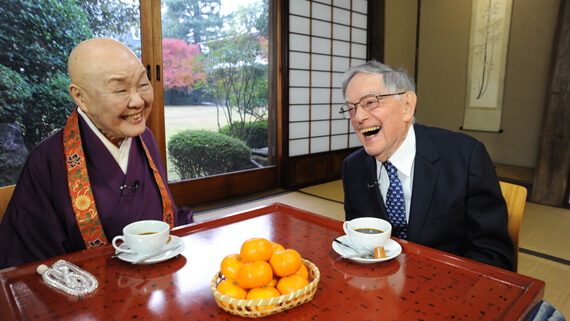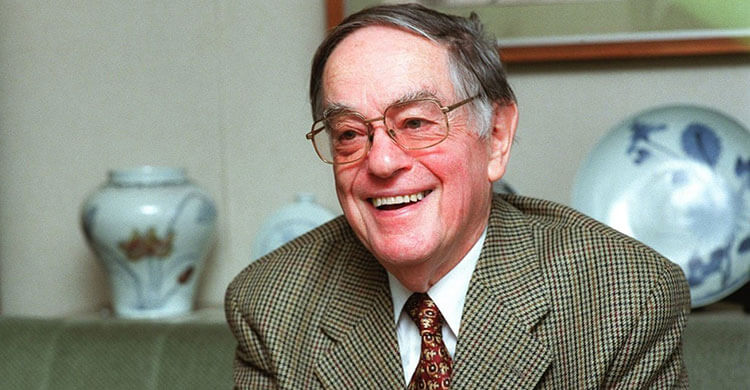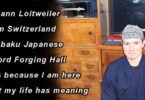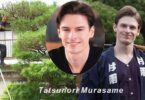Hi everyone, how is it going? Today’s theme is an obituary notice of ” Donald Keene ” who was a leading scholar of Japanese literature.
Speaking of men and/or women who love Japan, however, in Japanese literature, it reminds me of Patrick Lafcadio Hearn.
Who is Patrick Lafcadio Hearn?
He was born in Greek on 27 June 1850 and died in Tokyo on 26 September 1904, known also by the Japanese name Koizumi Yakumo, was a writer, known best for his books about Japan, especially his collections of Japanese legends and ghost stories, such as Kwaidan: Stories and Studies of Strange Things.
In the United States, Hearn is also known for his writings about the city of New Orleans based on his ten-year stay in that city.
But today’s topic is not Mr.Lafcadio Hearn, but Mr. Donald Keene who passed away in Tokyo at the age of 96 the day before yesterday (on February 24, 2019).
Then who’s Donald Keene?
Renowned U.S.-born Japanologist and prominent Japanese literature scholar Donald Keene, he was enchanted by Japanese literature and culture through his encounter with “The Tale of Genji,” an 11th century pageant of Heian-era court life.
“The Tale of Genji,” was written by Murasaki Shikibu in the early 11th century, is a love story featuring the son of an emperor. It is generally considered the world’s first novel.
He devoted the rest of his life to studying and introducing Japanese works both ancient and modern to the world.

with Jyakucho who was a nun and also a novelist (1922~2021)
Keene is professor emeritus at Columbia University in New York and the winner of the Japanese Order of Culture in 2008, the first non-Japanese to be selected.
Keene was born in New York in 1922. After graduating from Columbia University, he attended the U.S. Navy’s Japanese language school following war breaking out between Japan and the United States in December 1941.

When he was entered at Columbia University at age 16
Keene served as an intelligence officer for the U.S. military in Hawaii and Okinawa, translating Japanese soldiers’ diaries and interpreting for Japanese POWs.
After World War II, he continued his study of Japanese literature at Harvard University and Cambridge University.
In the 1950s, he began compiling an anthology of Japanese literature while studying at Kyoto University, paving the way for Japanese literature to be introduced to the world through his translation work.

Donald Keene (front center) poses for a photo with Haru Reischauer (front left), wife of then U.S. Ambassador to Japan Edwin Reischauer (third row, left), renowned author Yukio Mishima (second row, right) and others in front of the U.S. Ambassador’s Residence in Tokyo upon receiving the Kikuchi Kan Prize in 1962
The works he translated include the 14th-century classic “Essays in Idleness” by Yoshida Kenko, and novels by contemporary authors such as Kobo Abe and Yukio Mishima.
He also remained close to Japanese literary giants–Junichiro Tanizaki and Yasunari Kawabata, a Nobel laureate of literature.
Keene traveled between Japan and the United States for decades.
But he decided to settle in Japan after acquiring Japanese nationality following the Great East Japan Earthquake, tsunami and nuclear disaster in March 2011 that hit the northeastern Tohoku region.
Even though it was widely reported at the time that the quake disaster motivated him to move to Japan permanently, it had already been known among his close friends that Keene had long wanted to become a Japanese citizen.

He obtained Japanese citizenship, holding his Japanese name written on the board in 2012
He visited disaster-affected regions to encourage residents.
After settling in Japan, Keene published critical biographies of poets Masaoka Shiki and Ishikawa Takuboku.
His exposure to Japanese writings from both times of peace and war led him to delve into modern Japanese authors and introduce Japanese literary works abroad.
Almost a decade after the war when Keene was studying Japanese literature at the graduate school of Kyoto University in western Japan, a newspaper’s Osaka edition reported him in an article dated Feb. 18, 1954, as a “blue-eyed” learner of Kyogen, a traditional farce presented between Noh plays.
“I’ve been very lucky,” Keene would later tell a newspaper reporter at every interview. He blazed the trail in introducing Japanese literature to the rest of the world when such works still had a low international profile, riding the wave of the Japan craze that was gripping European and North American countries at the time.
Yet his “luck” was largely derived from his infinitely inquisitive mind and tireless efforts, which brought him encounters and connections with many people. Keene, a multilinguist, also played a role in the introduction overseas of works by Kenzaburo Oe in other languages. Oe was commended with the Nobel Prize in Literature in 1994.
Keene has received many awards, including — as its first non-Japanese recipient — the Yomiuri Literary Prize, in 1985, for “Travelers of a Hundred Ages,” the best book of literary criticism in Japanese, and the Order of Culture, bestowed on him by Emperor Akihito in 2008.
“My life is inseparable from Japan,” he said, continuing his research into things Japanese into the very final years of his life.
Since around last summer, Keene was in and out of the hospital, but remained eager to create his own works.
He was also a man of humor, erecting a Keene family grave at a temple next to his home in Tokyo’s Kita Ward, which bears a family crest of a yellow dog (kiin), a play on the phonetic sound of “Keene” in Japanese.
His adoptive son Seiki Keene, a shamisen player for Bunraku puppet theater, released a comment saying, “My father passed away peacefully. He reached the end of his life in a home country of his own choice. I believe he couldn’t have been any happier about his life.”

With his adopted son Seiki Keene
A funeral service will be held with only his relatives attending. A public memorial service is planned for a later date.
Finally, we asked 「if you were reborn, would you like to be Japanese or American?」
「That’s a very difficult question. I really don’t know. I am quite happy in Japan. Perhaps I should be reborn as Japanese, as I think that would maybe be easier for me. But if I was to be reborn as Japanese, it would have to be now — not into the Japan of 60 years ago. I don’t want to be a militarist; I don’t want to become a kamikaze pilot. So, a Japanese person living nowadays, not in the past.」
“May his soul rest in peace!”
Lastly, we have a person who had loved Japan, “Love-Japan Japanophilia, and Masked Pro Wrestler “The Destroyer” dies” that you’ll find interesting, thanks









